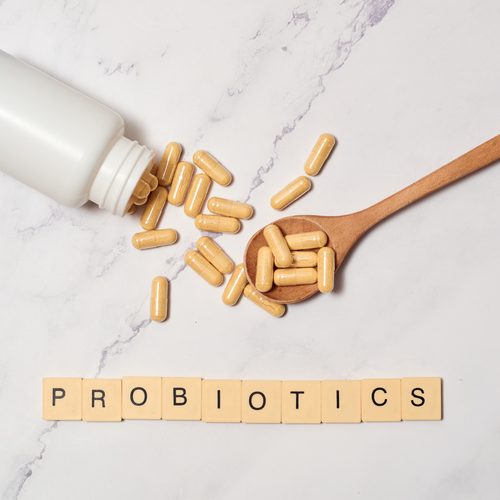What to remember :
- Constipation can be occasional (less than 3 stools/week) or chronic (more than 6 months)
- To fight constipation naturally, it is important to ensure a balanced diet rich in fiber and probiotics and good hydration.
- Regular physical activity is also essential to boost digestive transit.
- Herbal medicine and micronutrition are good natural solutions for combating constipation.
Constipation and its causes
Constipation is defined as an inability to have a bowel movement. It can be occasional , with a frequency of less than 3 bowel movements per week, or chronic when it has lasted for at least 6 months.
It can be due to various causes, whether medical or not.
Poor lifestyle and constipation
An unbalanced lifestyle can be the cause of occasional constipation. Indeed, diet, hydration, and physical activity are the main causes of constipation.
A diet rich in processed fats, low in fiber and lacking in variety, as well as a lack of hydration and a sedentary lifestyle can cause a slowing down and weakening of digestive transit.
Stress and negative emotions are also major factors in digestive disorders. Because the brain and gut are closely linked, they communicate and influence each other, particularly in the case of mental disorders such asdepression .
Medications, pathologies and constipation
Some medications such as opioid pain relievers cause a decrease in intestinal motility, which can cause constipation problems.
Similarly, certain pathologies (hypothyroidism, multiple sclerosis, diabetes, etc.) can cause this same decrease or generate inflammatory processes that cause an alteration of the microbiota and the occurrence of intestinal disorders.
Specific situations that cause constipation
Certain periods of life such as childhood, pregnancy or old age can be marked by increased sensitivity to digestive disorders. Indeed, whether this is due to a lack of development of the digestive system , a reorganization of the functioning of the body or a decrease in intestinal motility due to age, it is possible to be more prone to regular constipation at these times.
NB : Its progression can be dangerous because it can lead to obstruction or fecal impaction, which requires medical intervention. It is therefore strongly recommended to consult your doctor or go to the emergency room when it is associated with fever, severe abdominal pain, vomiting, or other physical problems.
How to naturally remedy constipation?
#1 - Water, the ultimate anti-constipation remedy
Hydration is the first line of defense to effectively and naturally combat temporary constipation. Indeed, we can never say it enough, but good daily hydration is essential for optimal digestion. Indeed, this allows the food bolus to be well hydrated and allows good absorption at the intestinal level while promoting good progress of this bolus along the digestive tract. Likewise, this will optimize the action of fibers .
It is generally recommended to drink 1.5 liters of water per day . In case of constipation, it is strongly recommended to increase the intake to 2 liters per day . To optimize its action, you can choose water rich in magnesium.
Foods rich in water can also help supplement our water needs during periods of constipation.
#2 - Fiber, your intestinal anti-constipation ally
Fibers are mostly polysaccharides (carbohydrates) which have the particularity of not being digested by digestive enzymes, but by intestinal bacteria. They therefore have no energy value, but they are of capital importance in regulating transit.
We distinguish between soluble fibers , which absorb up to 3 times their weight in water, and insoluble fibers , which absorb up to 25 times their weight in water. The latter increase the mass of stools, thus accelerating transit. Overall, fibers have a laxative effect, but insoluble fibers are particularly recommended in cases of constipation .
In addition to their mechanical effect, and through their prebiotic effect , they participate in maintaining an optimal microbiota, thus promoting fermentation and healthy and functional transit.
There are many sources of fiber : cereal products (especially whole grains), dried and fresh fruits and vegetables, oilseeds, seeds, algae, oat bran, etc.
Here is a selection of some of the foods highest in fiber:
|
Food |
Fiber content per 100g |
|
Bran: corn, wheat, rice, oats |
79 g, 42 g, 21 g, and 16.5 g |
|
Dried/dehydrated wakame |
49 g |
|
Chia and flax seeds |
34 g and 27 g |
|
Legumes: beans, flageolets, lentils |
25g, 23g, 16g |
|
Almonds |
11 g |
|
Bulgur |
9.5 g |
|
Artichoke |
8 g |
|
Wholemeal bread |
7 g |
|
Quinoa |
7 g |
|
Wholemeal pasta |
6 g |
#3 - Probiotics in fermented foods
Fermented foods (natural probiotics) play a significant role in balancing the intestinal microbiota. Good bacteria counteract the entry of pathogens by strengthening the intestinal wall while promoting proper functioning of the digestive, immune, and metabolic systems.
The combination of probiotics and prebiotics creates unique symbiotics that multiply their actions. Indeed, they act synergistically and therefore in a complementary manner to combat constipation naturally.
#4 - Limit fatty foods
Fatty products, especially processed ones, can make digestion difficult , slow it down, and create even more digestive discomfort such as bloating. In fact, digesting fats requires the action of enzymes, bile, and gastric acid, which can severely tire the body . Modulating your diet can therefore help fight constipation naturally.
#5 - Physical activity
The digestion process involves different organs of the digestive system . These organs are made up of numerous muscles that can be activated during physical activity . Indeed, a flow of blood is redirected towards the muscles of the body and this allows digestion to be activated to allow good evacuation. Sport practice, carried out in a moderate way, therefore has numerous benefits for digestion and helps fight constipation.
#6 - Herbal medicine to combat constipation
To promote good digestive transit, it is possible to use plants and micronutrients to naturally combat constipation. Indeed, the active ingredients of certain plants will help activate digestion due to their draining and laxative properties. Here are the most effective: Psyllium, fenugreek, senegal, algae, pectins, magnesium, buckthorn . These natural remedies can complement a healthy and varied diet.
#7 - Abdominal massage
To facilitate bowel movements, it is helpful to mechanically boost digestive transit. Performing a stomach massage using gentle clockwise pressure for 2 minutes will boost bowel movements and thus naturally combat constipation.
#8 - Toilet Position
Some positions are better than others for bowel movements. Physiologically, sitting is not the best position. To promote proper bowel movements, it is recommended to elevate your feet on a small stool and lean slightly forward.
Sources :
[1] Yang, J., Wang, H.P., Zhou, L., & Xu, C.F. (2012). Effect of dietary fiber on constipation: a meta analysis. World journal of gastroenterology, 18(48), 7378–7383. https://doi.org/10.3748/wjg.v18.i48.7378
[2] Gao, R., Tao, Y., Zhou, C., Li, J., Wang, X., Chen, L., Li, F., & Guo, L. (2019). Exercise therapy in patients with constipation: a systematic review and meta-analysis of randomized controlled trials. Scandinavian journal of gastroenterology , 54 (2), 169–177. https://doi.org/10.1080/00365521.2019.1568544
[3] Cirillo, C., & Capasso, R. (2015). Constipation and Botanical Medicines: An Overview. Phytotherapy research: PTR , 29 (10), 1488–1493. https://doi.org/10.1002/ptr.5410
[4] Dimidi, E., Christodoulides, S., Scott, SM, & Whelan, K. (2017). Mechanisms of Action of Probiotics and the Gastrointestinal Microbiota on Gut Motility and Constipation. Advances in nutrition (Bethesda, Md.) , 8 (3), 484–494. https://doi.org/10.3945/an.116.014407
[5] Dimidi, E., Mark Scott, S., & Whelan, K. (2020). Probiotics and constipation: mechanisms of action, evidence for effectiveness and utilization by patients and healthcare professionals. The Proceedings of the Nutrition Society , 79 (1), 147–157. https://doi.org/10.1017/S0029665119000934













